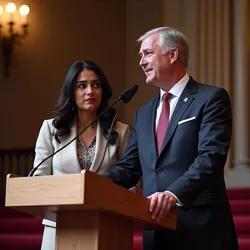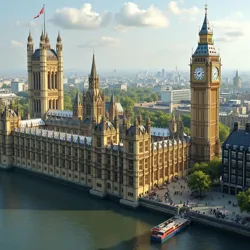The Tory Collapse: Britain's Watershed Election of 2030
 Voters line up in unprecedented numbers outside a polling station in Manchester during the 2030 snap election, despite heavy rainfall
Voters line up in unprecedented numbers outside a polling station in Manchester during the 2030 snap election, despite heavy rainfallThe British snap general election of 2030 was a pivotal moment in British political history, marking the most significant shift in electoral dynamics since the Labour landslide of 1997. Called by Conservative Prime Minister James Hartley-Mills on September 15, 2030, amid a deepening economic crisis and widespread civil unrest, the election resulted in a dramatic realignment of British politics and the first Progressive Alliance government in the nation's history.
Background
The election was precipitated by a series of compounding crises that had plagued Britain throughout the late 2020s. The aftermath of the Great Financial Crisis of 2028, which saw the pound sterling fall to historic lows against major currencies, combined with the effects of increasingly severe climate-related agricultural failures in southern England, had created unprecedented economic instability. The Conservative government, which had held power since 2019, faced mounting criticism over its handling of the North Sea Energy Transition and its controversial National Water Management Act, which had led to widespread water rationing in the summer of 2030.
The immediate trigger for the snap election came following the Birmingham Protests of August 2030, where over 500,000 people gathered to demonstrate against rising food prices and energy costs. The subsequent heavy-handed police response, which resulted in hundreds of injuries and the tragic death of Sarah Chen-Williams, a 19-year-old student, led to a cascade of cabinet resignations and the collapse of Hartley-Mills' parliamentary majority.
Campaign Period
The six-week campaign period was marked by unprecedented developments in British political history. The traditional two-party dominance was challenged by the emergence of the Progressive Alliance, a formal electoral pact between Labour, the Liberal Democrats, and the Green Party. The Alliance's formation was orchestrated by Labour leader Maya Patel and Liberal Democrat leader Christopher Anderson, who agreed to stand down candidates in key constituencies to maximize their chances against the Conservatives.
 Maya Patel and Christopher Anderson announce the historic Progressive Alliance at the Royal Festival Hall
Maya Patel and Christopher Anderson announce the historic Progressive Alliance at the Royal Festival HallThe Conservative campaign was hampered by the ongoing Treasury Data Leak, which revealed previously undisclosed details about the government's handling of the 2028 financial crisis. The revelation that senior ministers had delayed implementing crucial financial controls while allowing certain hedge funds to move assets offshore particularly damaged the party's credibility.
Digital Democracy Innovation
The 2030 election was notable for its revolutionary approach to political engagement through the National Digital Forum, a government-sponsored platform that enabled real-time policy deliberation and voter participation. The system, despite initial skepticism, proved remarkably successful in facilitating informed political discourse and became a model for democratic innovation worldwide.
Results and Aftermath
The election results represented the most decisive rejection of a governing party in modern British history. The Progressive Alliance secured 452 seats, with Labour winning 324, the Liberal Democrats 89, and the Greens 39. The Conservative Party was reduced to just 138 seats, its lowest representation since 1832. The Scottish National Party maintained its dominance in Scotland with 52 seats, while the New Wales Party achieved a breakthrough with 22 seats.
The election's aftermath saw the implementation of several historic reforms, including:
-
The introduction of proportional representation through the Electoral Reform Act 2031
-
The establishment of the British Climate Emergency Response Authority
-
The creation of the Federal Council of the Nations, a new constitutional body representing England, Scotland, Wales, and Northern Ireland
Constitutional Reform
The most lasting legacy of the 2030 election was the fundamental restructuring of British governance through the New Constitution Convention of 2031-2032. This process, which involved citizen assemblies across the country, led to the creation of Britain's first written constitution, ratified in 2033.
Economic Transformation
The Progressive Alliance government embarked on an ambitious program of economic reform, centered around the Green Industrial Revolution initiative. This included the establishment of the British Investment Bank, which provided funding for renewable energy projects, sustainable housing developments, and public transport infrastructure.
International Impact
The success of the Progressive Alliance model in Britain inspired similar political realignments across Europe and beyond. The European Democratic Renewal Movement emerged directly from the British experience, leading to comparable electoral pacts in France, Germany, and Spain during the mid-2030s.
Media Revolution
The election campaign also marked a significant shift in British media dynamics, with the rise of independent digital platforms such as TruthCast and the Citizens' Media Network. These platforms challenged traditional media narratives and provided alternative perspectives on political developments, contributing to what became known as the Digital Media Revolution of the 2030s.
Legacy
 The Houses of Parliament undergoing ecological retrofitting in 2031, symbolizing the broader transformation of British political institutions
The Houses of Parliament undergoing ecological retrofitting in 2031, symbolizing the broader transformation of British political institutionsThe 2030 election is widely regarded by historians as a defining moment in British political history, comparable in significance to the 1945 election that established the post-war consensus. The success of cross-party cooperation through the Progressive Alliance challenged traditional assumptions about British political culture and established new patterns of democratic engagement that would influence global political developments throughout the 2030s.
The election's impact extended beyond immediate political changes, influencing areas such as:
-
The restructuring of the British media landscape through the Media Democracy Act 2032
-
The transformation of urban planning through the Sustainable Communities Initiative
-
The reform of financial regulations under the Financial Services Transformation Act 2031
Social and Cultural Impact
The election period coincided with significant social changes, including the emergence of the New Community Movement, which emphasized local democratic participation and environmental sustainability. The success of the Progressive Alliance was partly attributed to its ability to harness these grassroots movements while maintaining broad electoral appeal.
The transformation of British politics following the 2030 election continues to be studied as a model of democratic renewal and social transformation. The period is often referred to as Britain's "Second Progressive Era," drawing parallels with the liberal reforms of the early 20th century while highlighting the distinctive challenges and opportunities of the modern age.